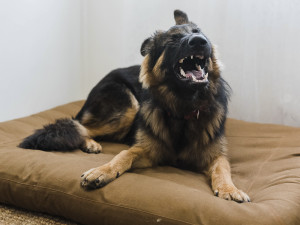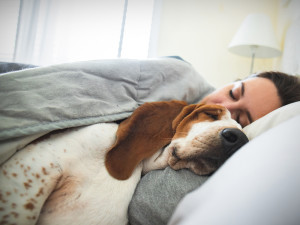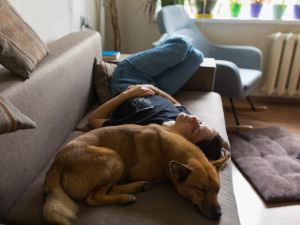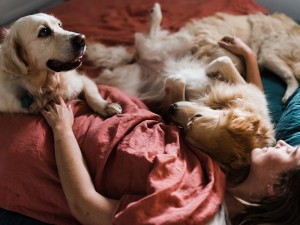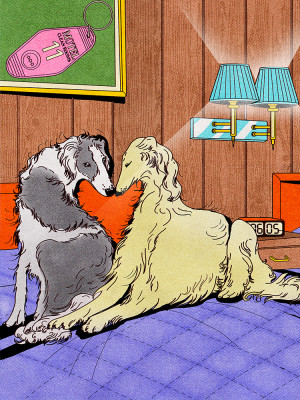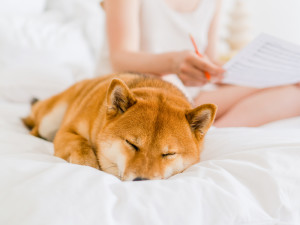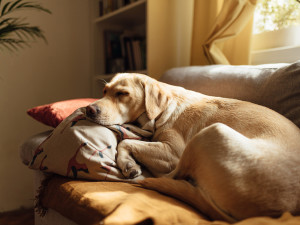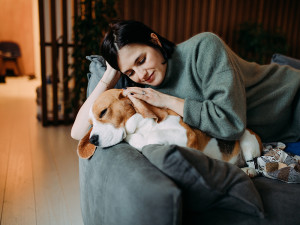Why Does My Dog Snore?
It seriously sounds like another human being is in the room.

Share Article
In This Article:
Is It Normal for Dogs to Snore? Common Causes of Dog Snoring How to Stop Your Dog From Snoring
Have you ever been startled awake by your dog’s loud snoring? Like, so loud that it sounds like a human being is snoozing away? While it may be amusing at first, it’s important to understand the reasons behind this noisy habit.
Is It normal for dogs to snore?
It’s normal for some dogs to snore occasionally. Some dog parents are comforted by the sounds of their pup’s snoring. Others are not so amused and wonder, Why does my dog snore so loud I can’t sleep?
Normal snoring is typically consistent and not accompanied by other symptoms. However, abnormal snoring may have a sudden onset or be accompanied by signs like labored breathing, nasal discharge, or exercise intolerance.

Common causes of dog snoring
Some dogs are more likely to snore than others. Some causes of snoring, like breed, can’t be controlled, while others, like obesity, can be managed. Does your dog snore loudly? One of these reasons may be why:
Breed-specific anatomy
Brachycephalic (flat-faced) dog breeds, such as French Bulldogs, English Bulldogs, Pugs, Boston Terriers, and Shih Tzus have airways that make them more prone to being noisy breathers.
Any time air isn’t able to flow smoothly through the airways, there can be sounds, including stertorous snoring sounds. These short-muzzled dogs are likely to have some degree of brachycephalic obstructive airway syndrome (BOAS), a condition that is characterized by physical traits including:
Narrow nostrils: Narrow nostrils can get even narrower during inhalation, making air passage more difficult and leading dogs to breathe through their mouth.
Elongated soft palate: The soft palate (the back of the roof of the mouth) can be so long that it starts to cover the airway and partially blocks passage of air into the lungs. This causes snoring due to vibrations as air passes by this partially blocked airway.
Everted laryngeal saccules: This tissue near the vocal cords is pulled inward during inhalation, which can partially block the airway and lead to snoring.
Large tongue: A large, thick tongue will take up more space in the mouth and start to occupy space in the throat, further obstructing air flow.
Narrow trachea: A narrow trachea (windpipe) means that a lot of air is trying to pass through a smaller than normal tube, causing more high-pitched sounds.
Obesity
Obese dogs are more likely to snore due to the excess fat surrounding their airway tissues. Dogs that are both obese and brachycephalic have a high risk of developing breathing issues far beyond snoring. They are more prone to heat stroke and are risky patients when it comes to anesthetic procedures.
Sleeping position
Like people, dogs can snore in certain positions and be silent sleepers in others. Any body position that contributes to restricted air flow, like sleeping on their back, can make a dog snore.
Allergies and respiratory infections
Respiratory infections, whether viral or bacterial, can cause airway inflammation and excess mucus production. Allergies commonly cause itchiness in dogs, but some dogs experience sneezing and inflamed airways. The inflammation and extra boogers can make breathing more difficult, leading to snoring.
Laryngeal paralysis
Laryngeal paralysis is a condition in which the nerves that control the vocal cords become weakened or paralyzed, leading to an airway that doesn’t fully open when a dog breathes in. Dogs with laryngeal paralysis often make loud, raspy sounds when they breathe and have hoarse, whispery barks. The condition can also make them more likely to snore. Laryngeal paralysis is most commonly seen in older large-breed dogs.
Foreign objects or abnormal growths
Foreign bodies or growths in any location in the airway can also obstruct air flow and cause noisy breathing and snoring. This can include benign nasal polyps, malignant tumors, or material in the nasal cavities or throat. Dogs with objects or growths in their airway may also exhibit sneezing, coughing, gagging, or nasal discharge.
How to stop your dog from snoring
An occasional snore from your dog is no big deal. However, persistent loud snoring can disrupt your sleep and be a sign of an underlying issue. If a gentle nudge isn’t enough, here are some tips to minimize your dog's snoring:
Weight management
Overweight dogs are more likely to snore, so make sure your dog stays at an ideal body weight. Provide plenty of opportunities for exercise and play, feed a nutritious diet, and be mindful with snacks. If your dog continues to gain weight despite your best efforts, consult with your vet.
Protection from infection
Take steps to protect your pup from contagious respiratory infections. Keep your dog up to date on vaccines and preventative care. Stick to play dates with dogs who are also current on their shots and free of respiratory symptoms.
Air-quality control
Doggie airways can be irritated by dry air and allergen particles. Consider a humidifier or air purifier in the room where your dog sleeps.
Adjusting sleeping arrangements
Dogs are more prone to snoring when they sleep on their back than when they sleep on their side or stomach. To promote peaceful sleep, provide a dog bed or pillow that encourages a position less likely to cause snoring.
When to consult a veterinarian
If your dog’s snoring has gone from kind of cute to a total nightmare, talk to your veterinarian. It may be time to investigate possible underlying medical issues or adjust treatment of chronic issues like allergies. See your vet about your dog’s snoring if you notice the following:
Your dog’s snoring is new
Your dog is “snoring” while awake
Your dog seems to have sleep apnea (they stop breathing while asleep)
Your dog has a hard time breathing while awake
Your dog has additional respiratory symptoms like coughing or nasal discharge
Your vet can use your dog’s medical history and physical exam findings to determine the level of concern. An airway exam may also be recommended to check deep in your dog’s throat. Sedation is usually required for your vet to be able to take a good look while your dog takes nice, deep breaths. Imaging like radiographs or rhinoscopy (looking at the nasal passages with a camera) can also be used to evaluate the airways.
Treatment can vary depending on the factors contributing to the snoring, and can range from a weight-loss plan to medication for respiratory disease to surgery to help correct an obstructed brachycephalic airway.
FAQs (People also ask):
Is it normal for dogs to snore?
It’s normal for some dogs to snore, especially brachycephalic (smoosh-faced) breeds like Pugs and English Bulldogs. These dogs have airways that make them more prone to being snorers and noisy breathers.
Why does my dog’s breathing sound like snoring?
Any time air isn’t able to flow smoothly through the airways, there can be vibration and noise, including stertorous snoring sounds. A dog’s breathing may sound like snoring when it’s awake due to airway inflammation, breed-specific anatomy, foreign bodies, or growths.
Why is my dog snoring while awake?
There are several possible reasons why your dog may sound like they’re snoring while awake, including congestion from an upper respiratory infection, allergies affecting their airways, or symptoms from BOAS.
References:
Laryngeal Paralysis in Dogs: An Update on Recent Knowledgeopens in new tab
Nasal Polyps in Dogs: Five Cases (2005 to 2011)opens in new tab

Dr. Alycia Washington, DVM, MS
Alycia Washington is a small-animal emergency veterinarian with over 10 years of experience based in North Carolina. She works as a relief veterinarianopens in new tab and provides services to numerous emergency and specialty hospitals. She also works as a veterinary writer with a focus on educating pet parents.
Related articles
![Woman wearing a black t-shirt and jeans laying on the couch with her dog taking a nap]()
What Are the Effects of Sleeping With Your Dog in Bed?
There are pros and cons of sleeping with your dog—for both of you.
![Woman lying in bed with two golden retrievers]()
13 Reasons You Should Let Your Dog Sleep in Your Bed
It’s science (and adorable).
![An illustration of 2 dogs on a bed]()
Three’s a Crowd: When One Partner Doesn’t Want the Dog in the Bed
You want them to cuddle up, your S.O. doesn’t. Here’s how to handle the great bed debate.
![Shiba inu dog sleeping in bed]()
My Dog Sleeps All Day—Is That Normal?
Dogs need more sleep than humans. Here’s how much is healthy.
![A dog laying on a couch peacefully.]()
I’m Not Lazy...
If hypothyroidism is to blame, it’s best not to let sleeping dogs lie.
![Dog with sleep startle reflex. Woman lays on her couch and gently wakes up her dog]()
Why Does My Dog Freak Out When I Wake Them Up?
“Let sleeping dogs lie” is more than just a confusing old saying.

